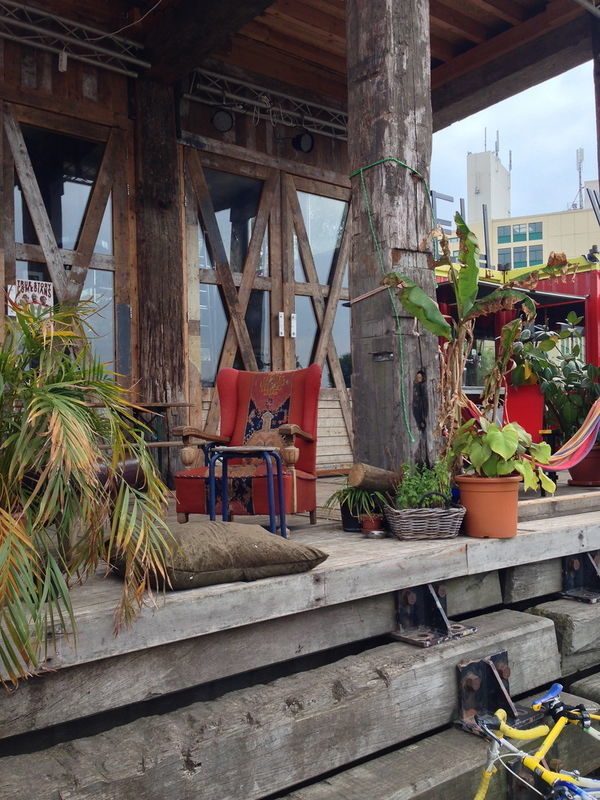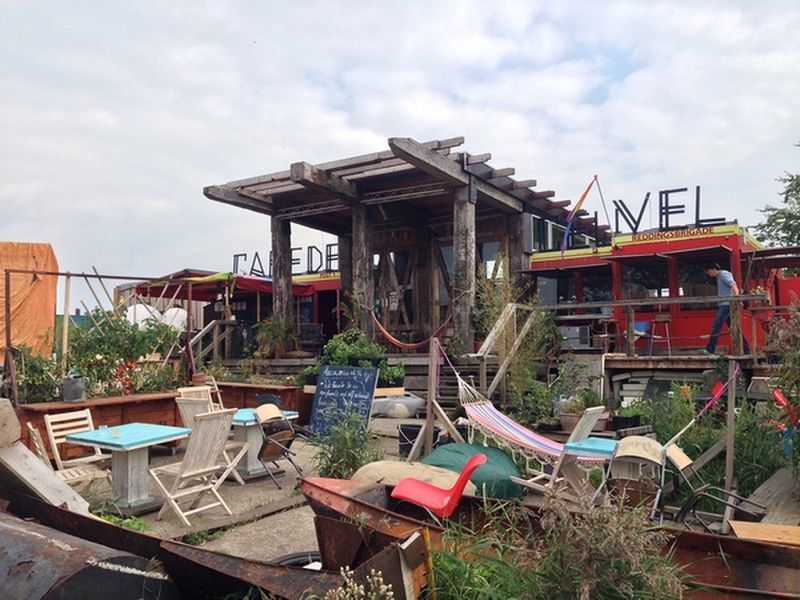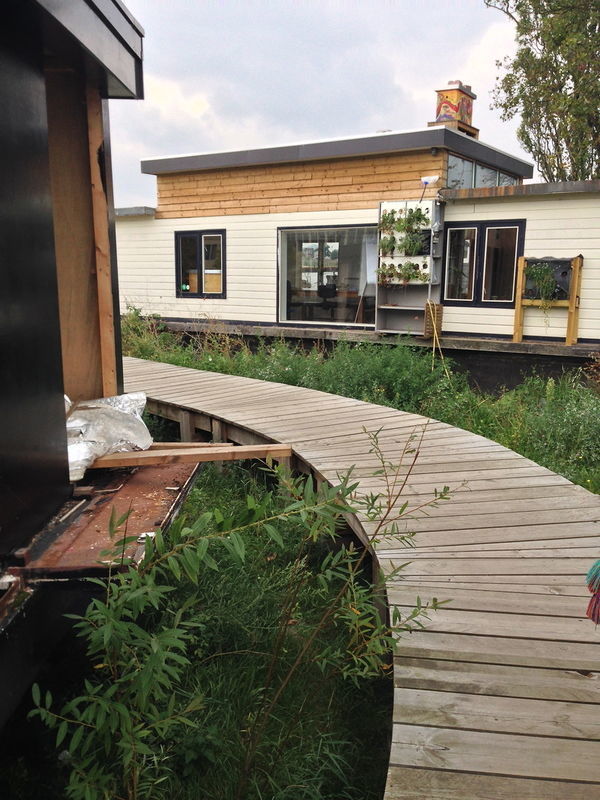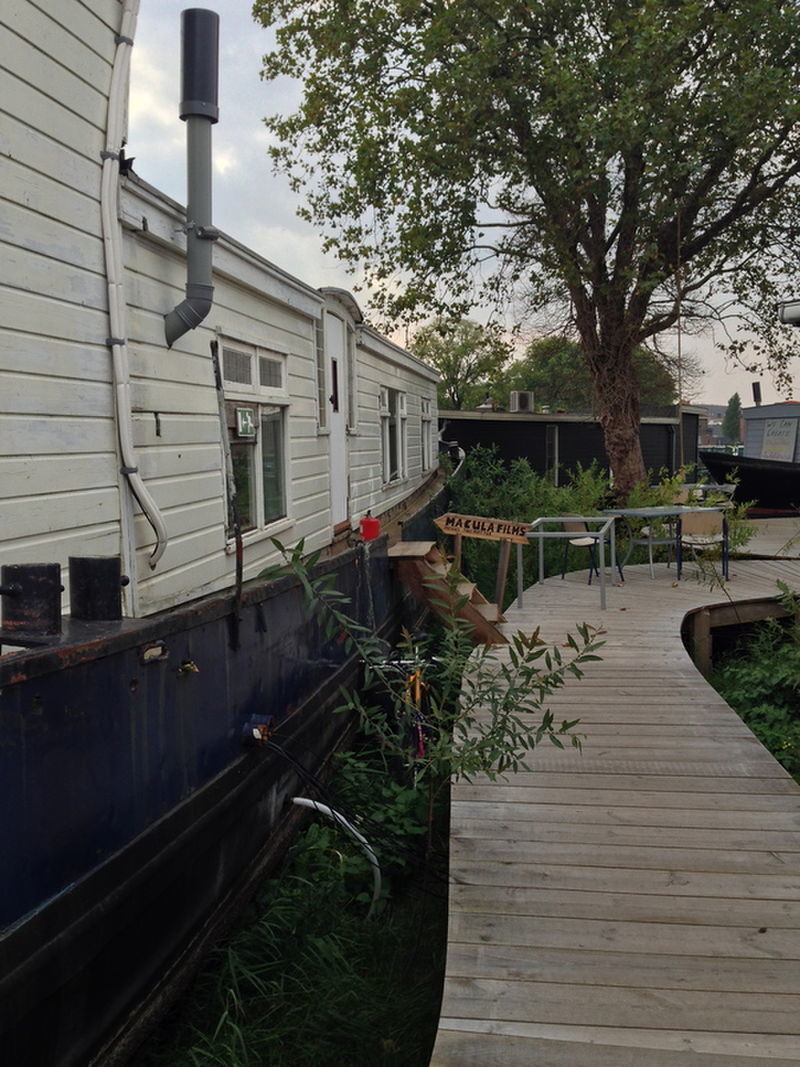De Ceuvel
Author: Carli Schenkeveld
Next to the van Hasselt canal at the IJ in Amsterdam-Noord, a former ship warf today harbours a very special association of creative and social entrepreneurs. This polluted, fallow piece of land had found a new temporary function in which the polluted soil will be cleaned, left-over houseboats are reused and autarkic ways of living, working and building are tested and shown in a Do It Yourself manner. De Ceuvel is run by a group of landscape-/architects, artist, photographers, designers a.o. Due to their amazing plan that combines sustainabilitya and social motives, stimulates the local economy (keeping transport cost low) and sets up a foundation as well as an incentive, the site was appointed for a 10-year lease from the Municipality of Amsterdam. Running for almost one year now, De Ceuvel already established an up and running public cafe called Café de Ceuvel. Also the site harbours workplaces for creative and social entrepreneurs, which at the same time serves as a community of entrepreneurship. This is not just any kind of community, you will not find a place like this anywhere else in Europe as extensive as De Ceuvel.
Contents
AN ALL SELF-SUSTAINING CAFE
The cafe is the first thing that catches your eye on the site because of it's robuste architecture. The frame seems to be build from old harbor bollards. The entire cafe appears to be built completely(!) with recycled materials. Referring back to the roots of the area, an old ship warf in the harbor of Amsterdam. The café is already very popular to the people of Amsterdam & is being used for shows, expositions and research.
 pavilion designed by architect Wouter Valkenier
pavilion designed by architect Wouter Valkenier
CLEANING THE SOIL
"Pollution: By filling the area with polluted dredge and through the polluting activities of the ship wharf, the area is heavily polluted with organic as well as inorganic pollutants. The heavily polluted soil will be purified by phytoremediation techniques, in which plants are used to clean the soil. A specially selected combination of plants is used to stabilize, break off and take up pollutants.
Working Landscape: On the site of De Ceuvel this organic way of cleaning the soil will result in a working landscape, cleaning the soil while creating habitat and producing low-impact biomass. The biomass from the area will be used to develop products and energy. A small biomass gasifier at the site will convert the biomass into energy, which is used in the houseboats on site. At ‘de Ceuvel’ the polluted soil is the catalyst of innovative concepts and initiatives in the field of (cultural) sustainability.
Design: Because the site is polluted with a mixture of pollutants, the site will be densely planted with a mixture of purifying plants. The fragmented area will be transformed in one undulating ‘green sea’, matching the rugged character of the industrial and harbour area it is part of. Heavily polluted soil will be utilized to create a purifying spatial sculpture, constructed from re-used concrete. In the core of the area purifying trees will be planted that take up large amounts of water and pollutants. Floating platforms with water-cleaning and food-production gardens extend the green character onto the water. This cultivated wilderness is accessed by a winding boardwalk avoiding direct contact with the polluted soil.
The innovative way of soil cleaning and low-impact biomass production that is applied at De Ceuvel is an example to many other areas, to become a large scale network of ecologically, economically and socially interesting areas. ‘De Ceuvel’ can become the beating heart of this new landscape of Amsterdam.
(The design, research and management of the purfying park at ‘de Ceuvel’ is done by DELVA Landscape Architects in collaboration with the University of Ghent.)" source:http://deceuvel.nl/project/park/
RE-USING IN THE MOST ECONOMIC & CREATIVE WAY
woonboten in de Amsterdamse grachten die niet meer goed functioneren, zijn erg duur om van af te komen, het wegslepen & sloop van een woonboot bedraagt al gauw Houseboats were upgraded to offices, studios or workshops for creative and social entrepreneurs.
Crowdfunding self-reliant participatie samenleving met vrijwilligers
allom is het een prachtig initiatief dat laat zien dat in tijden van crisis een goed plan met flinke schouders eronder, wel degelijk een goede kans heeft.
Future plans
The formal industry terrain was slowly formed to this unique urban development. The public areas like Ceuvel Café and Bed & Breakfast are a part of the future plan to become entirely self-sustainable. Re-using water & energy.
De Ceuvel was crowned ‘Frame’ of Public Dutch Award; It’s one of Europe most sustainable and unique urban developments.


